February is Black History Month. Let’s keep that supportive energy going year-round.
We spoke to 12 members of the STEM community, who shared their thoughts on how to create more supportive, equitable, and engaging environments.

We spoke to 12 members of the STEM community, who shared their thoughts on how to create more supportive, equitable, and engaging environments.

February is a time to celebrate the countless contributions Black scientists have made to STEM fields. It is also a time to reflect on the additional work needed to create professional and academic environments where everyone can thrive.
We spoke to 12 members of the STEM community, who shared their thoughts on how to create more supportive, equitable, and engaging environments.
Here’s what they had to say.
Pay. Engage. Build trust. Recognize aspirations and lived experiences. Four simple ways institutions can support Black scientists year-round.
Special thanks to this anonymous contributor for their valuable input.
They’d also like you to check out: https://www.coronacarehi.org/

Text version of graphic:
Various institutions can support Black scientists by:
– Anonymous
UGA Anthropology PhD student, co-founder and president of the Black Science Coalition and Institute (B-SCI)
Acknowledging the role institutions have played in upholding discriminatory systems is an important first step toward creating an inclusive environment. More from Jordan Chapman (@jchapnocaps) below.
Jordan’s website: https://www.b-sci.org/online-resources

Text version of the graphic:
“If the scientific community truly wants to elevate Black and underrepresented scientists year-round, It needs to acknowledge its contributions to creating systematic racism. Then, all of science needs to work on the way science is taught to the public and increase financial support to aspiring Black and underrepresented scientists.”
Jordan Chapman, UGA Anthropology Ph.D. student, co-founder and president of the Black Science Coalition and Institute (B-SCI)
Underrepresented Student Officer for the University of California Student Association and Project Manager for the Telese Lab
Wise words from Syreeta Nolan.
Connect with Syreeta:
On Twitter:
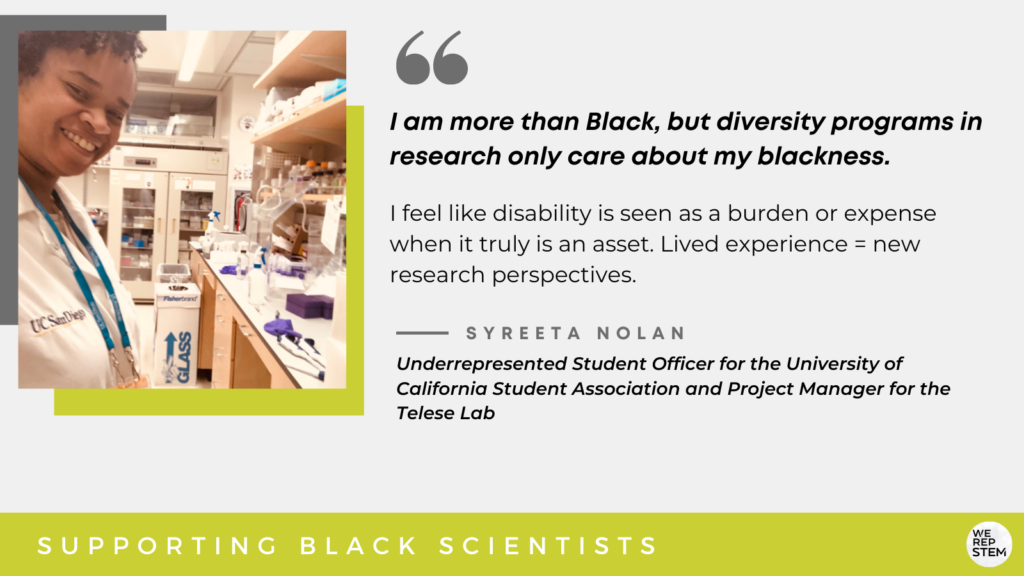
Text version of the graphic:
“I am more than Black, but diversity programs in research only care about my blackness. I feel like disability is seen as a burden or expense when it truly is an asset. Lived experience = new research perspectives.”
Syreeta Nolan – Underrepresented Student Officer for the University of California Student Association and Project Manager for the Telese Lab
Computer Systems Engineer
Inclusive spaces protect well-being and can have a direct impact on quality of research, @Ricardo_0621points out.
More about Ricardo:
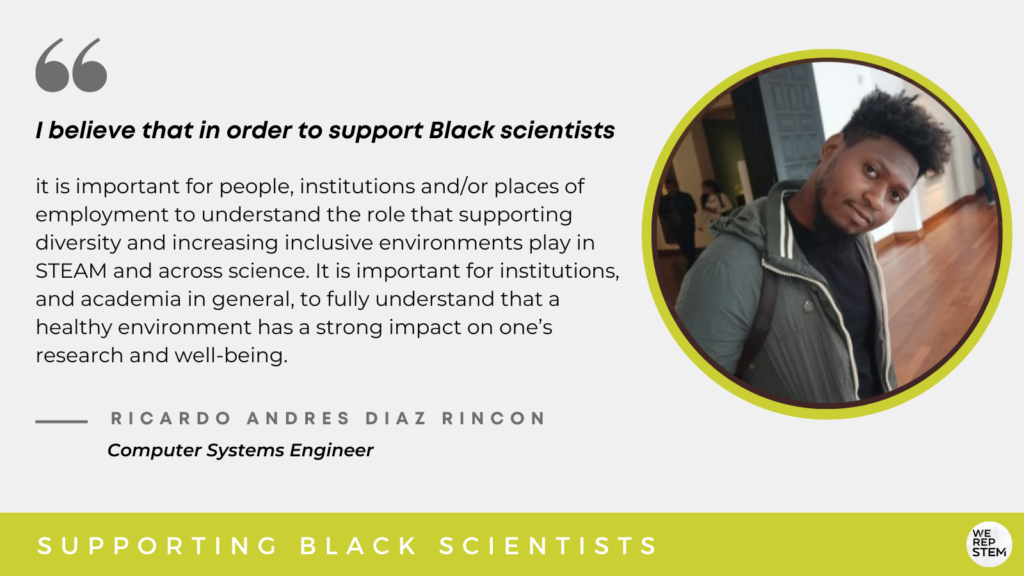
Text version of the graphic:
“I believe that in order to support Black scientists it is important for people/institutions/places of employment to understand the role that supporting diversity and increasing inclusive environments play in STEAM and across science. It is important for institutions, and academia in general, to fully understand that a healthy environment has a strong impact on one’s research and well-being.”
Ricardo Andres Diaz Rincon, Computer Systems Engineer
Postdoctoral Fellow, Hematology Oncology, Icahn School of Medicine at Mount Sinai
Hire. Retain. Develop. Powerful words from Dr. Green:
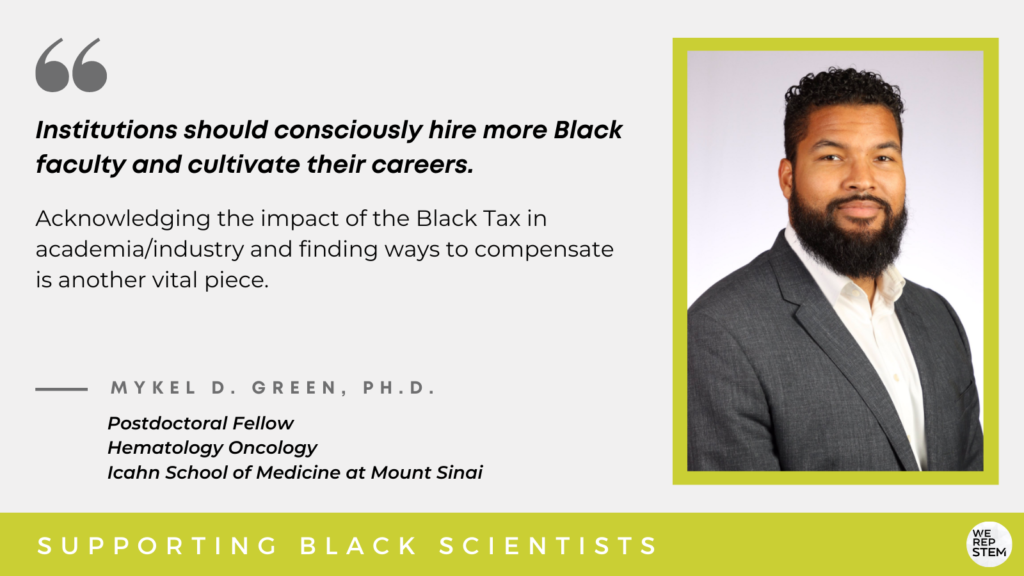
Text version of the graphic:
“Institutions should consciously hire more Black faculty and cultivate their careers. Acknowledging the impact of the Black Tax in academia/industry and finding ways to compensate is another vital piece.”
Mykel D. Green, Ph.D. , Postdoctoral Fellow, Hematology Oncology, Icahn School of Medicine at Mount Sinai
Pharmacist and Public Health Researcher
An equitable environment allows everyone to thrive. Thank you for your insight, Dr. Iwu-Jaja.
Connect with Dr. Iwu-Jaja here:
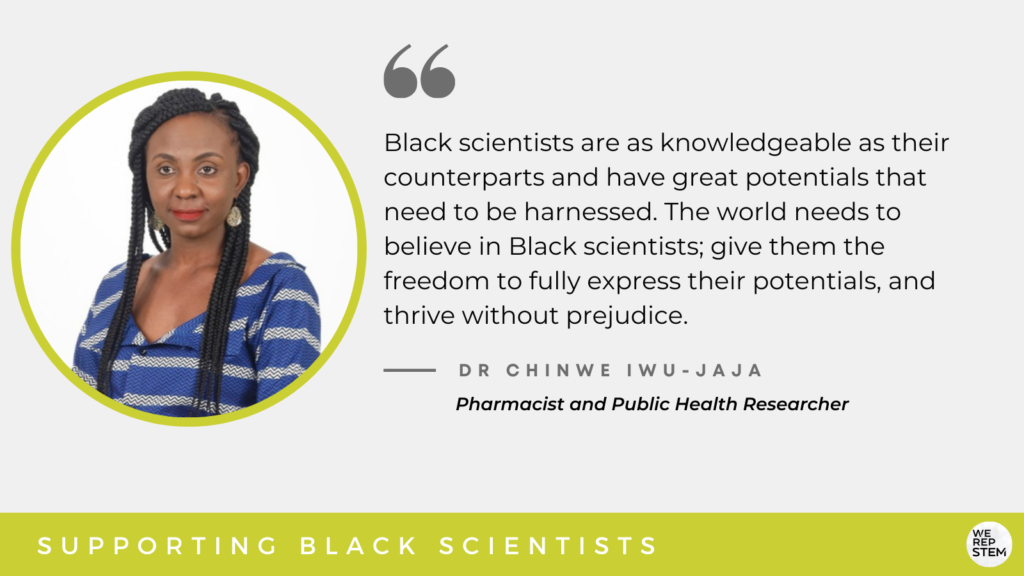
Text version of the graphic:
“Black scientists are as knowledgeable as their counterparts and have great potentials that need to be harnessed. The world needs to believe in black scientists; give them the freedom to fully express their potentials, and thrive without prejudice.”
Dr. Chinwe Iwu-Jaja, Pharmacist and Public Health Researcher
Monica F. Cox, Ph.D., Professor, Department of Engineering Education, The Ohio State University, CEO and Founder, STEMINENT LLC
Powerful words from Monica F. Cox, Ph.D. on the importance of cultivating AUTHENTIC diversity initiatives.
Connect with Dr. Cox:
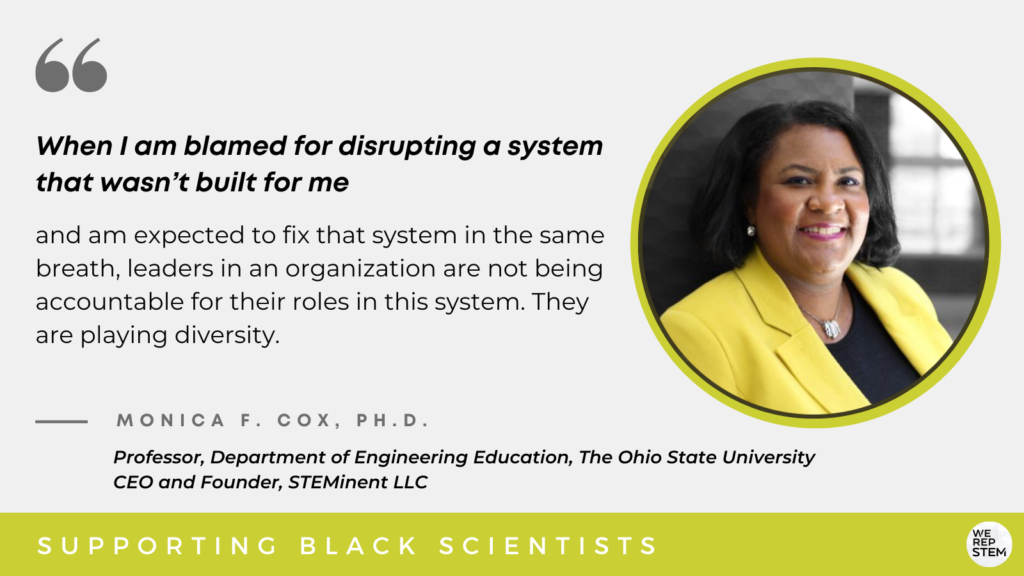
Text version of graphic:
“When I am blamed for disrupting a system that wasn’t built for me and am expected to fix that system in the same breath, leaders in an organization are not being accountable for their roles in this system. They are playing diversity.”
Monica F. Cox, Ph.D., Professor, Department of Engineering Education, The Ohio State University, CEO and Founder, STEMINENT LLC
Astrophysics Ph.D. student, Institute of Space Sciences
Elevating and supporting scientists benefits us all. Thank you for sharing your thoughts, Abubakr!
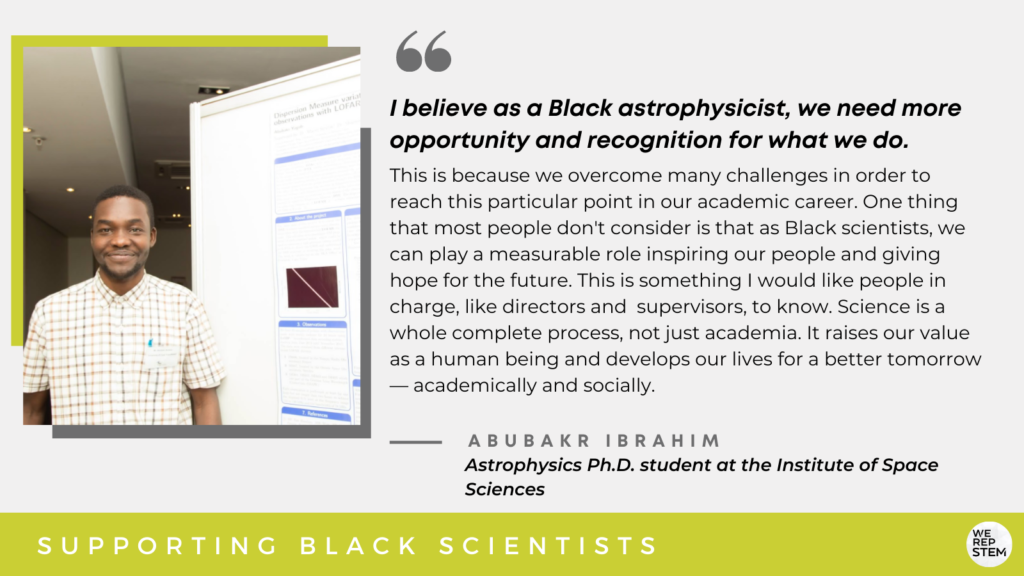
Text version of graphic:
“I believe as a Black astrophysicist, we need more opportunity and recognition for what we do. This is because we overcome many challenges in order to reach this particular point in our academic career. One thing that most people don’t consider is that as Black scientists, we can play a measurable role inspiring our people and giving hope for the future. This is something I would like people who are in charge, like directors or supervisors, to know. Science is a whole complete process, not just academia. It raises our value as a human being and develops our lives for a better tomorrow — academically and socially.”
Abubakr Ibrahim, Astrophysics Ph.D. student, Institute of Space Sciences
PhD Candidate, Department of Ecology and Evolutionary Biology, Princeton University
We need to move beyond platitudes and support Black scientists in a tangible way, as Christopher (Twitter: @TEburst) rightfully points out.
Christopher is also affiliated with @playcousins502. Check them out here: (https://www.playcousinscollective.com/)
Text version of graphic:
“Practice Ujimaa. Collective works and responsibility. Support Black scientists by working with them. To prove you value Black scientists and Black people, look at their material conditions and better them.
My material conditions don’t stop on February 28th, and neither should your value and support. If this is about moving beyond caricature, then make our lives better in a tangible way. This takes more than empathy, it takes forethought and the true spirit of collaboration, of community, and looking out for someone else.”
Christopher George Lawrence, Ph.D. Candidate, Department of Ecology and Evolutionary Biology, Princeton University
Postdoctoral Fellow in the Yale Cancer Biology Institute (@CancerYale)
Invest in talented Black scientists. More insight from Dr. Starbird:
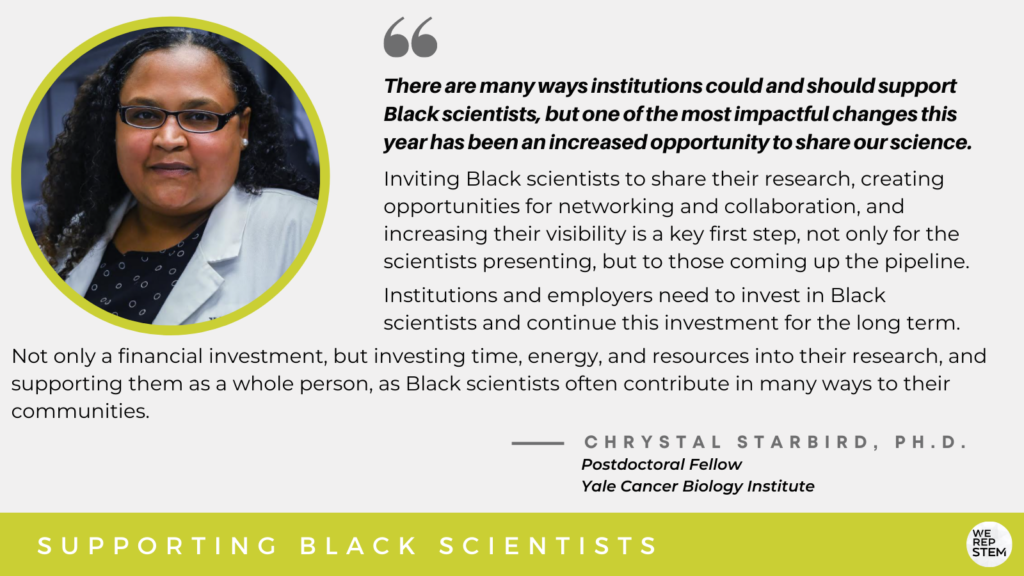
Text version of graphic:
“There are many ways institutions could and should support Black scientists, but one of the most impactful changes this year has been an increased opportunity to share our science. Inviting Black scientists to share their research, creating opportunities for networking and collaboration, and increasing their visibility is a key first step, not only for the scientists presenting, but to those coming up the pipeline.
Institutions and employers need to invest in Black scientists and continue this investment for the long term. Not only a financial investment, but investing time, energy, and resources into their research, and supporting them as a whole person, as Black scientists often contribute in many ways to their communities.”
Chrystal Starbird, Ph.D., Postdoctoral Fellow in the Yale Cancer Biology Institute
Postdoctoral Research Associate
If you are committed to creating lasting change, you’ll need to get comfortable with being unfomcortable, Dr. Henderson III points out.
Learn more about the Black in Cancer community here:
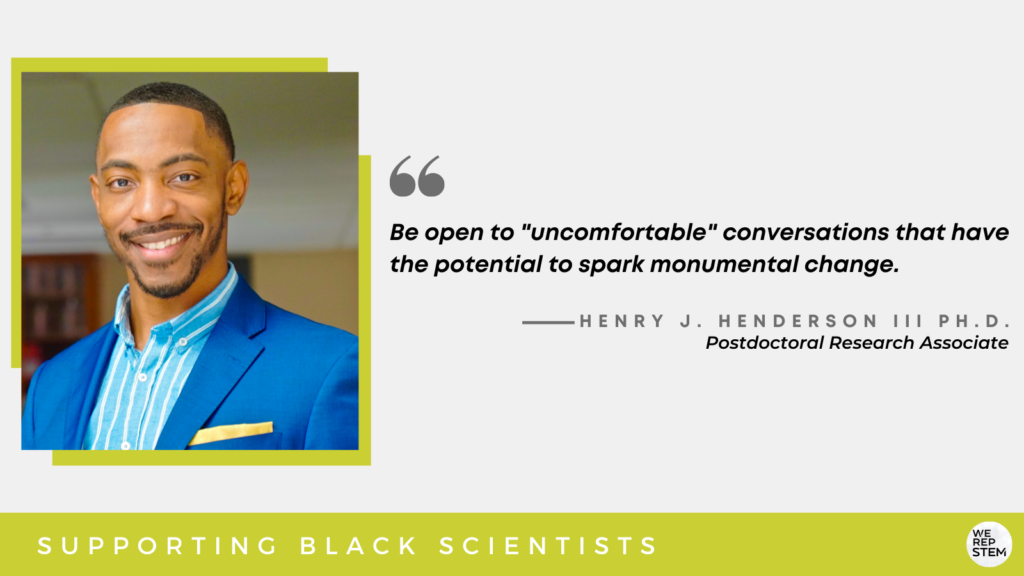
Text version of the graphic:
“Be open to “uncomfortable” conversations that have the potential to spark monumental change.”
Henry J. Henderson III
Postdoctoral Research Associate
Pharmacology Ph.D. Candidate, University of Virginia
Here’s an easy way you can start supporting Black scientists today. Thank you for sharing, Merci!
Connect with Merci:
Text version of the graphic:
“Support Black scientists year-round by amplifying our voices during meetings. It’s already hard enough to be the only one or one of few in predominantly white spaces, so when we speak up, actively listen.”
Merci Ngozi Best
Pharmacology Ph.D. Candidate, University of Virginia
Let’s keep the conversation going. Tweet us @werepstem with your thoughts on how individuals and institutions can support Black scientists year-round.
